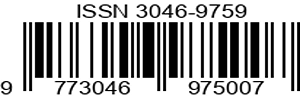MOTIVATING SECONDARY SCHOOL STUDENTS TO LEARN GRAMMAR THROUGH GAME-BASED STUDENTS RESPONSE SYSTEMS (GSRS) APPLICATION : STUDENTS’ PERCEPTION IN INDONESIA
DOI:
https://doi.org/10.62734/jetling.v3i1.215Keywords:
Game-based Student Response Systems (GSRS), Kahoot!, Motivation, Intrinsic Motivation, TensesAbstract
The present study aimed to perceive students’ perception in learning grammar through GSRS in secondary schooling context in Indonesia. GSRS can help the students to boost their engagement and motivation. Qualitative case study was used as research design. 12 students participated in this study. They were selected by using purposive random sampling. Questionnaire and interview were used to collect the data regarding students’ perception in using Kahoot application. The questionnaire comprises 20 questions and the interview consists of 9 questions. The collected data were analyzed quantitatively. The findings of the study showed that the students’ responses toward Kahoot! Application use in learning grammar were positive. The students felt enjoyable during the class (75%) and they were motivated to learn tenses or grammatical point (58,3%). Another finding found is Kahoot! could reduce the boredom of learning process in grammar class (58,3%). While Kahoot! Application provided positive impact on students’ motivation in learning grammar, the sudentts also experienced challenges in learning grammar during the class such as unstable network and limited time to response the questions. The study empirically shows that students’ perception toward Kahoot! application in learning grammar is positive. It can encourage secondary school students to learn grammar more enjoyable.
Downloads
References
Audyna, R. (2021). Students’ Perception On The Use Of Kahoot Application Toward Students’ Motivation In Learning English At Sman 1 Takalar. Repository UMY.
Braun, V., & Clarke, V. (2006). Using Thematic Analysis in Psychology. Qualitative Research in Psychology. doi:https://doi.org/10.1191/1478088706qp063oa
Budiati, B. (2017). Use: Kahoot Program For English Student's Learning Booster. Ict Information And Communication Technology).
Duff, P. A. (2008). Case Study Research in Applied Linguistics. Routledge, 22. doi: https://doi.org/10.4324/9780203827147
Harmer, J. (2007). The Practice of English Language Teaching (4th ed., Vol. III).
England: Longman Pearson.
Inayanti, A. &. (2016). Improving Students’ Grammar Ability (Simple Past Tense) Using Johny Grammar Word Challenge Application In Junior High School. Proceeding of the International Conference on Teacher Training and Education, Volume 2 No 1, 129-134.
Licorish, S. A. (2018). Students' Perception of Kahoot! Influence on Teaching and Learning. Research and Practice in Technology Enhanced Learning, Vol 13 No 1.
Malone, T. W. (1981). Toward a Theory of Intrinsically Motivating Instruction (4th ed.).
California: Xerox Palo AIto Research Center .
Nurlaela, S. M. (2020). The Implementation of Kahoot in Improving Students’ Tenses Understanding in Higher Education. International Journal for Educational and Vocational Studies, Vol 2 No 11, 908-913.
Omar, N. (2017). The Effectiveness of Kahoot Application towards Students‟ Good Feedback Practice . Internataional Journal of Social Science, 2552-2562.
Prensky, M. (2001). Digital natives, digital immigrants. On the Horizon, Vol 9 No 5, 1-6.
Shiny, K. (2013). Time and Tense: A Critical Review of Literature. International Journal of English and Education, Vol 2 No 2, 32-41.
Tahir, A. I. (2020). The effect of using Kahoot! for learning . Computers and Educations,
Vol 149 No 2.
Tomakin, E. (2014). Teaching English Tenses (Grammar) in The Turkish Text: A Case of Simple Present . International Journal of Learning and Development, Vol 4 No 1, 115-131.
Wang, A. (2015). The Wear Out Effect of a Game-based Student Response System.
Computers and Education, 82, 217-227.
Yin, R. K. (2003). Case Study Research and Applications Design and Methods. Cosmos Corporation.
Wang I, A. A. (2016). The effect of points and audio on concentration, engagement, enjoyment, learning, motivation, and classroom dynamics using Kahoot! 10th European Conference on Game Based Learning.
Downloads
-
PDF
 Abstract
View: 175,
Abstract
View: 175,
 PDF
Download: 91
PDF
Download: 91
Published
How to Cite
Issue
Section
License
Copyright (c) 2023 Hekmah Nurhayati Nurhayati

This work is licensed under a Creative Commons Attribution-ShareAlike 4.0 International License.





